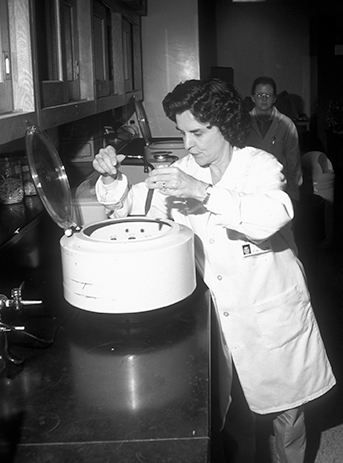

As part of Women’s History Month, we are sharing a Q & A with Dr. Sharon Patton that first appeared in the 2013 spring edition of Land, Life & Science magazine. She retired in the fall of 2014.
Take one parasitologist. Add a pinch of evangelist and toss in a little cheerleader. That’s been the recipe for success in Sharon Patton’s career. Patton, a professor in the Department of Biomedical and Diagnostic Services, came to UT 36 years ago as the first female faculty member of the College of Veterinary Medicine.
WHAT WAS IT LIKE TO BE FIRST FEMALE FACULTY MEMBER – DID YOU FEEL LIKE A TRAILBLAZER.
I was too young to feel like a trailblazer. In those early years, I did feel some responsibility for womankind. I had to be vigilant to be sure that the culture was welcoming to both male and female students and faculty.
WHY DID YOU CHOOSE THIS FIELD – AND WANT TO TEACH? Who knows why? I like the puzzles of figuring out parasites’ life cycles. Since I was raised on a farm and exposed to animals and diseases, gross things never bothered me.
Since she began her career, Patton has brought the same level of passion that she has for her profession into the classroom. She makes learning engaging and fun for her students, asking them to yell out answers and complete memorable phrases.
“My classes are like an old-time gospel meeting,” says Patton. “I have them yell out answers to my questions and complete my sentence when I say ‘Hookworms are…’ and they’ll yell, ‘VORACIOUS BLOODSUCKERS!’.” The purpose of all this is to enhance learning. I try to assure that some important principles will be remembered forever. Patton also devises lab cases for students with real-life scenarios of parasites infecting animals and causing disease that they must identify and make recommendations to treat and prevent. She requires a lot of work, but if they do it diligently they will learn the material and do well in her courses and then be better-prepared veterinarians.
WHAT COURSES DO YOU TEACH? First and foremost I teach parasitology as well as parasitic principles in other courses in our curriculum such as zoonoses/food hygiene, alimentary systems, multispecies medicine, cardiovascular system, pharmacology I. With clinical rotations, I teach our students in each of their four years of veterinary school.
IS THIS SUBJECT WHAT VETS TAKE TO HELP THEM FIGURE OUT ILLNESSES AND DISEASES? Diagnosing, monitoring, and treating parasites are important to both animal and human health. Many parasites are zoonotic, meaning they can pass from animal to human and vice versa. It is a daily problem that the veterinarian sees. I am fortunate to be teaching a subject that the students usually understand is very practical and important.
SOME PEOPLE MAY THINK PARASITOLOGY IS A LITTLE GROSS – WHAT MAKES YOU LOVE THE FIELD SO MUCH?
I love it because it is practical and down to earth. I love the complicated life cycles and the mystery that is still involved in trying to understand how and why parasites do what they do. They are beautiful with very different characteristics such as teeth and alae and copulatory bursas. It is true they do horrible things to animals and people, and I love to foil them in these desires. I enjoy teaching students who are dedicated to improving animal and human life. One way to do that is to control and eliminate parasitic disease. Parasitism affects animal production and may bring on death and disease in animals and humans.
As a trailblazer herself, the parasitology professor knows the importance of teaching her students the fundamentals and provides them with tools to help them succeed in an ever-changing world.
“The environment and international travel have changed in the over three decades I’ve been teaching, new parasites are being discovered and new treatments are coming about and our understanding of control has changed, so most of what I teach I was never taught,” Patton said.
“There is always change, which is why I teach my students the importance of remembering the principles and understanding how something works so they can adapt to any change they may face.”
EXAMPLE OF WHAT YOU’RE TALKING ABOUT ABOVE… If you give a person a parasite, he will know that one parasite. If you teach the person to understand the characteristics and principles of parasitism, he can figure things out on his own for the rest of his life
(Patton has authored or co-authored over 100 scientific papers and has presented at over 150 scientific and service talks)